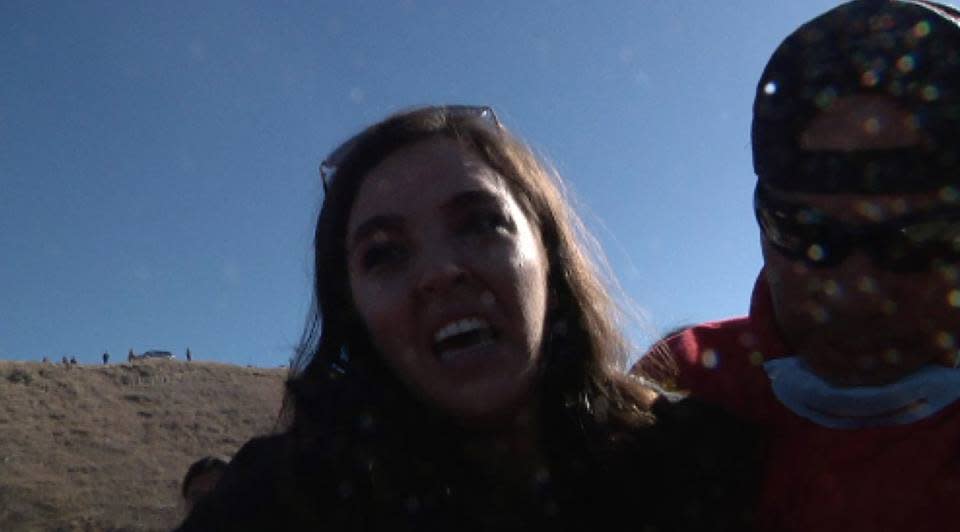"I Was Part of a Non-Violent Protest at Standing Rock. Then I Was Shot by Police with a Rubber Bullet."

Since April, activists at the Standing Rock reservation in North Dakota have set up camp to protest the controversial North Dakota Access Pipeline. But you've probably heard about them only recently, as #NoDAPL has risen to prominence on social media and cries for national attention to their cause have gone viral.
The proposed pipeline would carry crude oil from the Bakken oil field in North Dakota to a plant in Patoka, Illinois. It would span 1,720 miles, if completed. But Native Americans and advocates argue that its construction violates centuries-old treaties between the tribes and the United States government.
By now, work on the pipeline has advanced to the Missouri River crossing, where protesters have assembled. Energy Transfer Partners, the company spearheading the construction, has said that the entire pipeline will be "ready for service" by the end of 2016.
As militarized police forces have started to close in on the non-violent protesters, activists and journalists have traveled to North Dakota to cover the crisis. Erin Schrode, an organizer who ran for Congress earlier this year, decided to join them. On Wednesday, she was shot with a rubber bullet while she interviewed a non-violent protester. We reached her on Thursday for her first-hand account.
I was in Ohio last week, pounding the pavement, knocking on doors, making phone calls, getting out the vote with days to go until the most important election of my life. And I saw this call from the Standing Rock Nation for people to come, saying, "Please come. We need human beings here standing in solidarity with us to increase our numbers."
I called a friend and I said, "Listen, I need to go to Standing Rock." And he said, "How did you know I was on my way to Standing Rock?" We met in Iowa on Sunday. The stars aligned. We were clearly ready to be here. I hopped a plane and met him and we rented a car.
These men shot me at #StandingRock today. I pray for them– and for our peaceful, prayerful water protectors. #NoDAPL https://t.co/hUXigAF6u4 pic.twitter.com/5HI14dTEO8
- Erin Schrode (@ErinSchrode) November 3, 2016
When we got to [Cannon Ball, North Dakota], we didn't quite know what to expect. ... The solidarity of the people who are showing up from all over this country, the number of nations that are represented here, the number of people standing in solidarity―Native and non-Native―it was inspiring.
When we showed up, on the other side of the [Cannonball River], water-protectors started to cross through the frigid waters in the hopes of holding a prayer circle. We were on the other bank, trying to cover it, to capture it. There were snipers all along the ridge above us.
I was shot by militarized police WHILE interviewing a man on camera at #StandingRock…and here's the footage. #NoDAPL https://t.co/FfWiSCbiKf pic.twitter.com/4DRwNPkfZ9
- Erin Schrode (@ErinSchrode) November 3, 2016
We're watching people get pepper sprayed, get maced, coming back across the river wincing. I was facing the officers, facing where the main line was [and] talking to a Native American man. All of a sudden, I felt like someone [had] swung a mallet with all the force they could muster against my lower back. I whipped around, confused about what had happened, and I saw an officer pointing his gun at me. It was a rubber bullet gun, thank God, but I had just been shot in the back. I was doing absolutely [nothing]. I can tell you with absolute certainty this was an 100-percent non-violent protest.

There was no provocation, there were no actions of aggression, and I wasn't even facing where they were. I had out my phone, I was filming this man and speaking with him. I was in shock. I'm still in shock.
What I endured is nothing compared to what these people are enduring day in and day out. I feel the need to speak up about it because I am here, because this is an environmental catastrophe looming, because there is this long history of oppression, because media is getting targeted. That's why I'm here, for all of those reasons. They're targeting indiscriminately, they're targeting to intimidate. I was shot yesterday at point-blank range with a rubber bullet while covering the story. I feel betrayed by the government. I feel disgusted by the lack of action.
We need people here. If you can't come, can you send somebody to come? If you don't want to send somebody to come, call the White House, call the Attorney General's office, call the Army Corps of Engineers. Do that, that matters. Put that pressure on them.
What's great about our country is that people can affect change. But we can't just expect that our government is going to do what we want. "Change does not roll in on the wheels of inevitability, but comes through continuous struggle," as Martin Luther King said. And this is our ongoing struggle. I don't want to say, "Let's live out the promise of this country," because this country has done such horrific things to the Native American people in the past hundreds of years. But let's do right by our people and by our land for once.
This interview has been edited for clarity and concision.
You Might Also Like

